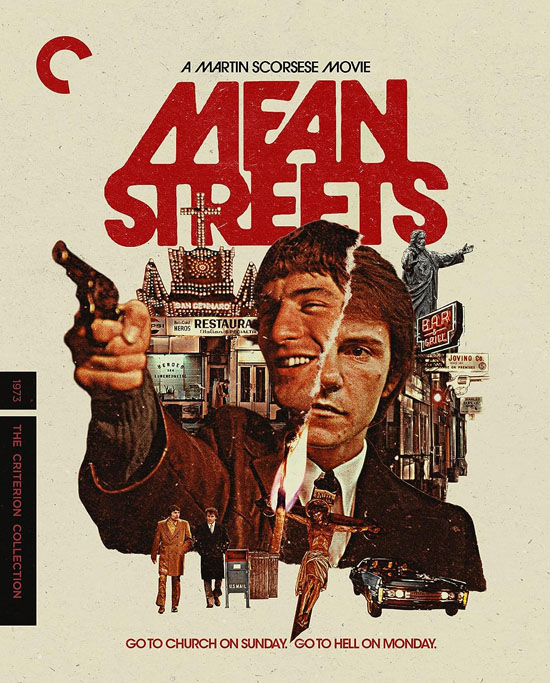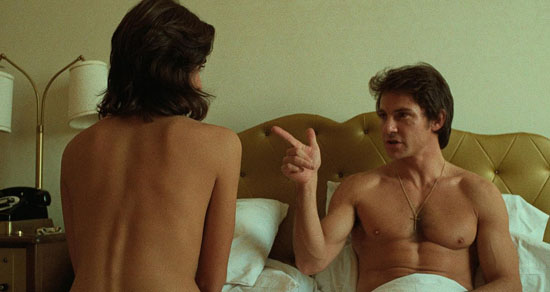
“A
VISCERAL LIFE IN LITTLE ITALY”
By
Raymond Benson
Although
he had made two previous feature films and several shorts, it was Mean
Streets that placed Martin Scorsese into the minds of discerning filmgoers.
This low budget independent picture (released by Warner Brothers) proved, as
filmmaker Richard Linklater states in a Directors Guild of America interview
with Scorsese from 2011 (presented here as a supplement), that artists who
wanted to make a movie could go out and find the means to put their
vision on the screen without interference from studio brass. Indeed, that’s
what Scorsese did.
At
the time, Scorsese was trying to make it in Hollywood. It was John Cassavetes
who had urged him to stop working for Roger Corman (for whom Scorsese had made
1972’s Boxcar Bertha) and “go back to his roots.” Well, Scorsese’s roots
were in the Little Italy neighborhood of New York City. He had grown up there.
He had friends there. He knew the life there, all the “goodfellas” and wannabe
tough guys and low level (and some high level) gangsters. So the filmmaker
crafted a screenplay with fellow NYU film school alumnus Mardik Martin, cast
guys he knew such as Harvey Keitel in the lead (he had starred in Scorsese’s
first feature, Who’s That Knocking at My Door from 1967, retooled and
released in 1968 and again in 1969) and Robert De Niro (who had also grown up
in the neighborhood and had known Scorsese when they were younger; this was
Scorsese’s first collaboration with De Niro, then an actor who had done some
Roger Corman films and was still attempting to up his game). Other familiar
faces that have appeared in Scorsese’s oeuvre were also cast—Victor
Argo, Harry Northup, David Carradine, and Murray Moston—but also other notable
actors who have been in mob-related pictures such as David Proval, Richard
Romanus, and Cesare Danova. Amy Robinson, who later became a producer (she
co-produced Scorsese’s After Hours in 1985) was cast as the female lead.
Mean
Streets features
the hallmarks of what we would come to know to be in a “Martin Scorsese Film,”
especially when he focuses on the underworld, a topic to which he has returned
many times: brotherhood, loyalty, friendship, betrayal, guilt (lots of guilt),
Catholicism, sex, drugs, rock and roll, crime, and violence. This life in
Little Italy is edgy, gritty, dangerous, and quite self-contained. There isn’t
a moment in which an audience might think—oh, this couldn’t happen… because
Scorsese convinces you that it can and has.
Charlie
(Keitel) is a small time hood in Little Italy. His uncle is Giovanni (Danova),
a big time Mafioso. Charlie acts as a big brother figure to his friend, Johnny
Boy (De Niro), who is reckless and not the brightest bulb in the socket, and
who owes money to several gangsters, including Michael (Romanus). Charlie
secretly dates Teresa (Robinson), who is Johnny Boy’s sister. She suffers from
epilepsy and is an outsider to the closed-knit Italian culture of the
neighborhood. Giovanni wants Charlie to get away from Johnny Boy, but Charlie
can’t do it. Eventually the debtors come to get Johnny Boy to pay up, and Charlie
must make decisions that will tear him apart. And that’s when the violence
erupts.

What’s
truly amazing about Mean Streets is that, according to cinematographer Kent
Wakeford, only 6% of the film was actually shot in Little Italy (this reviewer
believes it is slightly more, but certainly not as much as 10%). The rest was
all shot in the Los Angeles area! Scorsese and his design team managed
to find locations in California that somewhat resembled New York City, and
nearly all of the interiors were shot in real spaces (existing bars, hotels,
and apartments). No sound stages were used. For decades, critics and film
historians have touted Mean Streets to be one of the “great New York
films, shot on the streets” when, in fact, it wasn’t! That’s not to say that
it’s not a great New York film, because it is.
Mean
Streets is
a rough and ready, visceral, fast moving, in your face crime picture with unsavory
characters and a vibe that will make you nervous. You might ask, well, is it
entertaining? You bet your life it is. But with these ne’er-do-wells, your life
may not be worth much.
The
Criterion Collection presents a new 4K digital restoration approved by Scorsese
and frequent collaborator/editor Thelma Schoonmaker (who was not involved with
the film), with an uncompressed monaural soundtrack. After several home video
releases in the past on DVD and Blu-ray, this one is obviously tops.
Supplements
include the excellent previously mentioned discussion about the film between
Scorsese and Richard Linklater at the DGA; an audio commentary by Scorsese and
Amy Robinson on specific scenes from the film; a new, observant video essay by
Imogen Sara Smith about the picture; an interview with DP Wakefield; excerpts
from a documentary about co-writer Mardik Martin; a vintage promo video from
1973 about the making of the film (the only supplement ported over from
previous home video releases); and the theatrical trailer. The package booklet
contains an essay by critic Lucy Sante.
Mean
Streets is
a must-have for fans of Martin Scorsese, Harvey Keitel, Robert De Niro, and New
York City mob movies. Get it now… just remember to pay your debts!
Click here to order from Amazon